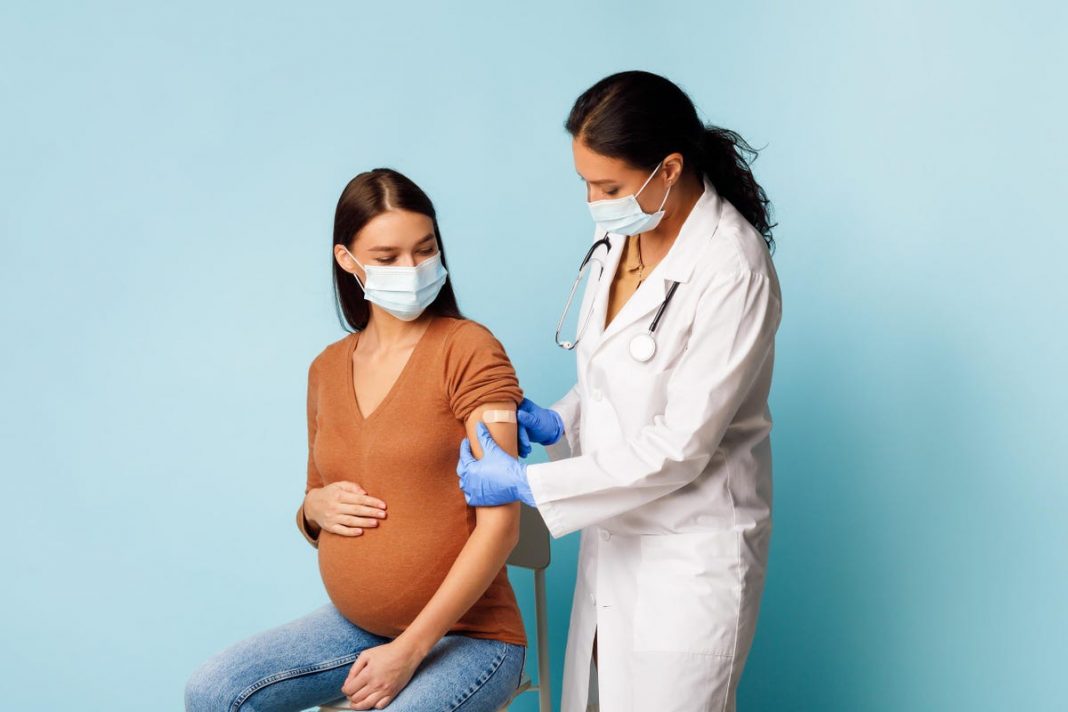Coronavirus Vaccination And Pregnancy. Nurse Vaccinating Pregnant Female Patient Against Covid-19
getty
Both the American College of Obstetricians and Gynecologists (ACOG) and the Society for Maternal Fetal Medicine (SMFM) have, from early on in the vaccine roll-out, advocated for Covid-19 vaccination for women who are either pregnant, considering pregnancy, or breastfeeding. As I covered in a December 2020 piece for Forbes, the widely spread misinformation associating the Covid-19 vaccines with infertility or pregnancy loss sadly added an unnecessary layer of concern for pregnant women or those considering pregnancy when it came to these vaccines.
These two national societies issued statements supporting the safety and efficacy for vaccines in this population as soon as the vaccines became available. However, misinformation often carries more cultural power and momentum than scientific data, and unfortunately many continue to hold off on receiving the vaccine.
Today, both societies updated guidelines on Covid-19 vaccination and pregnant patients, focusing specifically on provider tools to counsel patients. Obstetricians and gynecologists have a unique physician-patient relationship, which often begins in early adulthood for many women. During pregnancy, this connection becomes intensified, as frequency of visits range from every four weeks to every week or even more often. This gives the physician and patient ample opportunity to discuss the importance of vaccination and address concerns as they come up. It often requires more than one, or even two, conversations.
Doctor and pregnant patient
getty
ACOG provides an infographic for practitioners to give to pregnant patients, and recommends to practitioners to make this as well as fliers for both pregnant and breastfeeding patients available. In addition, consideration for having obstetrics offices being vaccine administration sites would likely increase the incidence of pregnant and post-partum women receiving the vaccine. Dr. Vivek Murthy, United States Surgeon General, emphasizes that the physician/patient connection can make a meaningful impact on a patient’s choice to receive a vaccine. At the 2021 ACOG Clinical and Scientific Meeting, he stated: “More than 80% of people say that they would turn to their doctor or to another health care professional who cares for them to actually make a decision about whether or not they should get a vaccine.” As obstetricians are the most regularly seen specialists in many people’s lives, counsel on a more personal level can make a big difference.
WASHINGTON, DC – APRIL 01: U.S. Vice President Kamala Harris talks with Surgeon General Dr. Vivek … [+]
Getty Images
The SMFM also states that provider counseling has a significant positive impact on patient vaccination. This counseling may include sharing important data that pregnancy in and of itself is an independent risk factor for severe Covid-19 infections. There is a three-fold risk of intensive care unit (ICU) admission and an over two-fold risk of requiring ECMO, or extracorporeal membrane oxygenation, an extremely high-risk last resort means of supporting a person’s oxygenation when the lungs are too severely failing to respond to mechanical ventilation alone. The risk of death due to Covid-19 infection while pregnant is nearly doubled than if not pregnant. Covid-19 infection during pregnancy also leads to increased risk of prematurity and fetal demise.
As of today, over 139,000 pregnant individuals have enrolled in the Centers for Disease Control and Prevention (CDC) v-Safe program, where individuals self-report any issues following Covid-19 vaccination. Published data is available for 35,000 pregnant women having received Covid-19 vaccinations between December 2020 and February 2021. The incidence of vaccine-related issues such as arm soreness and fever did not differ from that of the general population, and the incidence of pregnancy-related issues did not differ from the general pregnant population overall.
Mother and baby
getty
Counseling on the three different vaccines available (Pfizer/BioNTech and Moderna, both mRNA technology) and the Janssen Biotech/Johnson & Johnson (adenovirus vector technology) should be discussed, including the rare but real risk of TTS, or thrombosis with thrombocytopenia syndrome, as well as CVST, or cerebral venous sinus thrombosis syndrome. Both of these events were seen in women between the ages of 18 and 59 years, anywhere from 6 to 15 days following vaccination. None of these women were pregnant. Women under age 18 are eligible only for the Pfizer/BioNTech vaccine at this time, which is currently approved for people ages 12 years and up. The other two are currently approved for people ages 18 years and older.
For many individuals, the decision to proceed with Covid-19 vaccination, especially if pregnant, considering pregnancy, or breastfeeding, is not made with one conversation. Although safety and efficacy studies continue to demonstrate the great need for this population to be vaccinated, including data showing that newborns receive some antibody protection via umbilical cord blood and even breast milk, many women remain un-vaccinated. As we navigate these days and weeks of the highly infectious Delta variant wreaking havoc throughout the world, continued conversations with trusted physicians are a critical means of providing protection to this and other vulnerable populations.




